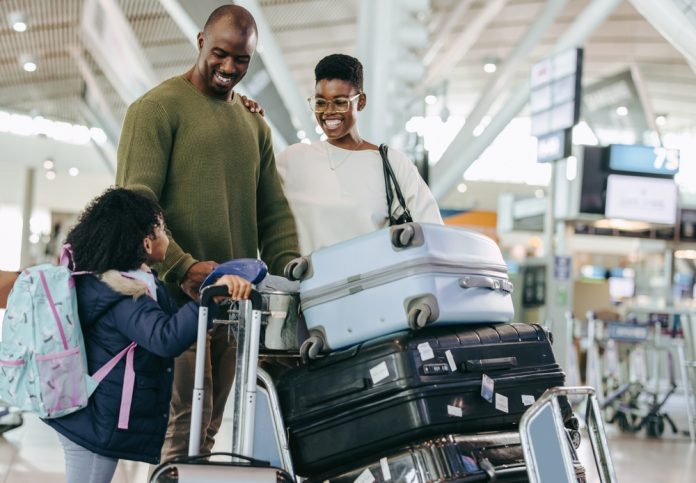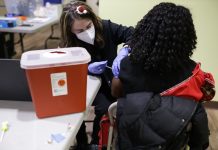

To say that the COVID-19 pandemic has disrupted the way we do things would be an understatement. The coronavirus, which is still spreading, has infected nearly 620 million people globally, 6.5 million of whom have died. But as devastating has it has been, it has made health care experts and policymakers to start thinking ahead and prepare better in case another pandemic strikes, and also to look at how they can streamline screening procedures to detect highly contagious diseases before they spread across borders.
Before the pandemic, many of us only needed to leave home with house keys, a phone. But the list has grown to include masks and hand sanitizers. If you’re leaving home for a short while, forgetting some of those items is no big deal. You can easily turn around, or buy them at the corner store. But what happens when you are travelling internationally?
In June, my family and I missed a flight from San Francisco, California, to Kenya to visit relatives we hadn’t seen in many years. We had planned the trip for the summer of 2020, but the pandemic forced us to postpone it then and in 2021. When it became relatively safer to travel, it didn’t occur to us that the pandemic had changed travelling so much that we needed more than just vaccinations, masks, and sanitizers.
When we got to the airport, the airline refused to let us on the plane because we had neither registered with Kenya’s Ministry of Health, nor uploaded our proof of vaccination to Global Haven, a COVID-19 test and vaccination validation site of the United Nations Development Programme. Of course we learned that after we’d stayed in the queue for an hour to get to the desk. And, as fate would have it, the Kenyan website was down. By the time we got through, the plane had departed. The airline wanted more than $20,000 to book my wife and I, and our two children for a flight the following day, on top the $5,000 we would lose because we had bought our tickets from a third party.
Since then, I have heard from three friends who also missed their flights because they didn’t realize the extent to which COVID-19 has changed the way we travel.
Immigrant communities like ours aren’t often the primary targets of travel security and health advisories from government agencies. Because of our foreign origin, our needs are also very unique, compared to American-born travelers. Immigrants are also significantly less well-off financially, which might make paying to reschedule a flight very expensive, and even impossible, and ruin trips we’ve taken years to plan. As many of us get ready to travel home for Christmas, what are some of the steps we need to take to make sure our travel goes smoothly?
Recently, I posed that question two experts from Minnesota Department of Health (MDH), who were generous enough to give Mshale an exclusive interview tailored to our community. Kathryn Como-Sabetti is the epidemiology manager of the COVID-19 Epidemiology at MDH, who for nearly 20 years has worked on various projects, including disease surveillance and pandemic influenza planning. Como-Sabetti says that before traveling, it is important to research the COVID-19 requirements for not just your final destination, but also wherever you plan to make a stop, even if it’s for a layover.

“There are some countries that have no requirements, and there are some countries with very strict requirements,” she says. “If you’re having a long layover and you need to leave the airport, you may be required to show a negative COVID test, or your COVID testing history. So, having all of that paperwork as a part of your travel packet is really important.”
Dr. Elizabeth Dufort, a pediatric infectious diseases physician who currently serves as a medical epidemiologist at MDH, says a visit to a travel health clinic should be part of preparations for international travel for both adults and children.
“When I speak with friends or community members or patients, or families who are going back to visit friends and family, I urge them to think of it as part of the preparation,” she says. “When you start to think about getting your flight, you should also book that appointment and think of that as part of the overall cost of your trip.”
One of the misconceptions those of us who were born abroad often have is that because we are familiar with the environment back home, we do not need to take the same precautions as, say, tourists who are visiting Africa for the first time.
But Dufort, whose 15-year career includes working on global health projects in Kenya, says spending years away from the continent can weaken one’s immune system and make them just as vulnerable.
“You’re going to go, and you’re going to eat all the food you used to eat and drink the things you used to drink,” Dufort says. “I want you to have that experience with your family or your cousins and your friends. But after you live in the U.S. [for many years], you lose some of that immunity you had built up.”
Dufort says people who are traveling home after being away for a long time need to remember that there are things circulating in the environment that we rarely encounter in the United States. Numerous studies have shown that people who are visiting friends and family abroad have higher rates of returning with diseases like malaria, typhoid, and dengue fever, she says. Making sure that you’re cooking all your food thoroughly, washing fruits and vegetables, and drinking water bottled from a safe source, can keep your trip from becoming unpleasant, Dufort says.
“We want you to remain safe, but also to enjoy your trip and not be sick and holed up inside with fever and diarrhea,” she says.

Dufort adds that those who have children born in the United States should not forget that their immune systems are much weaker, which makes tolerance of disease-causing germs much lower. Taking preventive measures like obtaining antimalarial drugs and insect repellents is important. But what children do once they get to the destination is just as important in keeping them healthy. Because of their upbringing around pets, American children are also more likely than African children to get closer to animals, which puts them at higher risk of contracting rabies, Dufort says.
“[American-born] kids, are used to these animals that are friendly to pet could get injured by animals that aren’t necessarily pets but guard dogs,” she says. “They might pet an animal in a way it doesn’t like. So, it is important also to talk to children who are old enough to have this conversation, and to watch the younger children.”
So, you’ve followed all the advice and have returned to the United States. Is there anything more you need to do? Como-Sabetti says that if you feel sick, you should see your health care provider immediately. She says outbreaks like COVID-19 and measles have made Minnesota’s health systems to create a comprehensive patient screening process that includes questions that health care providers ask about recent travel history.
“Those screening questions are very, very important,” Como-Sabetti says. “Knowing someone’s travel history is so vital to knowing what kind of assessment they should have. I would encourage people to answer those questions honestly and openly.”
She says it is also important for patients to ask questions, and to volunteer information to their health care providers about anything in their travel history that might have put them at risk, but wasn’t asked during the screening process.
My family and I learned the hard way that international traveling in a time of COVID-19 requires more than tickets, passports, visas, masks, vaccinations, home test kits, and hand sanitizers. Fortunately, my wife insisted on speaking with the manager, who booked us on the next flight without any additional fees. (When you travel with small children, they can melt hearts). But that took four hours to negotiate. In the end, we still had to spend more than $500 on a hotel room near the airport because we were more than 60 miles from home.
My friends weren’t so lucky when they missed their flights. Two of them paid more than $1,000 each to change their flights. One of them canceled his travel completely and lost more than $1,500.
Below are some resources Como-Sabetti and Dufort recommend to make planning your international travel easier. I especially love the Packing Smart list from the U.S. Centers for Disease Control.
Guidance for Travelers: International Travel & Infectious Disease
International Travel Health Clinics Serving Minnesota Residents
MDH Malaria Resources
CDC Travelers’ Health
CDC Travelers Destination Health Checklist
CDC Tips for Packing Smart
Docket: Minnesota State Immunization Records
About Edwin Okong'o - Mshale Contributing Editor
Edwin Okong'o is a Mshale Contributing Editor. Formerly he was the newspaper's editor.







